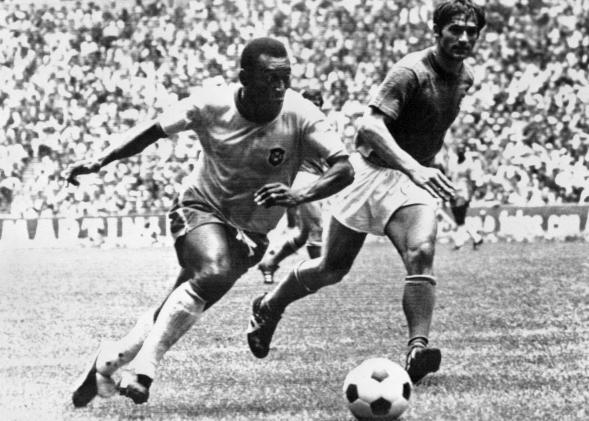Every weekend, Longform shares a collection of great stories from its archive with Slate. For daily picks of new and classic nonfiction, check out Longform or follow @longform on Twitter. Have an iPad? Download Longform’s app to read the latest picks, plus features from dozens of other magazines, including Slate.
The Rise of the Red Devils
Sam Knight • Grantland • May 2014
How Belgium put together a contender, and what the team means back home.
Until recently, Belgium’s much larger claim to fame has been its quiet, stubborn doubt that it is a nation at all. The 11 million people who comprise its population — a collection of French speakers, Dutch-speaking Flemish, and ethnic Germans — often give the impression that they just happen to live there.
Pelé as a Comedian
Brian Phillips • Run of Play • September 2010
The religious experience that is Brazil’s brightest star.
He’ll dribble into a crowd of three or four defenders, which is suicide for a footballer, even in Brazil in the 1960s; it’s almost impossible to keep the fine control you need to take a decent shot when all the defender needs to do is wallop the ball away from you. Pelé dribbles into a crowd of players who have put themselves between him and the goal and whose whole purpose is to get the ball away from him, to keep him from scoring, which again is infinitely easier than the task facing the attacking player, and often in these situations, instead of trying something dazzling or virtuosic, Pelé will just stop.
Nothing Can Stay Burie
Wright Thompson • ESPN • May 2014
A profile of Bosnian striker Vedad Ibisevic, who has come home after escaping the war more than 20 years ago.
Muslims and Serbs lived here for generations, sharing a land thick with centuries of brutal ethnic conflict and uneasy peace, until that morning in May. In this place, that history didn’t prevent the communities from existing as one, working the fields together and gathering when the work was done. It’s hard to understand what happened in 1992. Yugoslavia finally collapsed. Politicians convinced Serbs that their Muslim neighbors wanted to take their land and impose their religion and that only a pure Serb state would guarantee survival. The world went mad.
That Wonderful Summer
Seth Vertelney • SB Nation • March 2014
The members of 1994 U.S. Men’s National Team remember the tournament that changed the trajectory of American soccer.
[ERIC] WYNALDA: I just blocked everybody out, I put the ball down and I went into a zone. I wasn’t even going to listen to anybody that tried to talk me out of taking that, and they all laugh about it, but I literally was just unresponsive to anything. They were saying, “I’ll take it” or “Tap it to me and I’ll hit it” and Marcelo had an idea. I just didn’t listen to any of them. I just was really pushing everybody out of the way. I really wanted to take advantage of what I had learned from the night before. I knew I had to take a golf swing and not hit it too hard. I think that was the first time I ever hit a free kick that went exactly where it was supposed to, so good timing.
The Dream-Time of the World Cup
Supriya Nair • Roads & Kingdoms • May 2014
A globe-trotting history of the World Cup.
Football will not be extinguished even if the lights go out in these stadiums. The stands may empty out and rust start to eat the railings, but outside, some child with a ball of rags will still be kicking it around. There must be something essential at its core, therefore, that must be worth saving. If we don’t stop loving it, it won’t stop being footbal
Samba Soccer
Ben McGrath • The New Yorker • January 2014
The transformation of Brazil’s most storied team. (Subscription required)
In spite of the five World Cups that Brazil has won since—more than any other country—the Maracanã humiliation remains the most intellectualized aspect of its sporting legacy, if not of its modern history altogether. “When the players needed the Maracanã most, the Maracanã was silent,” the singer, songwriter, and poet Chico Buarque once declared. “You can’t entrust yourself to a football stadium—that’s the lesson that sunk in after 1950.”
